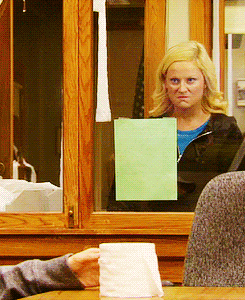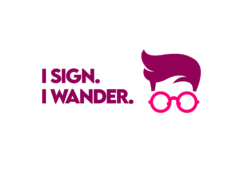Carl Barron: “I reckon Telstra should change their name to f**king Telstra cause every time you mention Telstra to someone they say “Ah, f**king Telstra”… Imagine if they did change their name. Call up and they say ‘Hello it’s F***ing Telstra. How can we p*** you off today? Ah, just do what you do every bloody day!”
There are two things that are absolutely guaranteed in life – death, and “f**king Telstra.”
My long suffering fiancé James and I, along with our four kids, moved into a newly built house in September 2015. If anyone has built a house, you would know it’s riddled with stress and lots of things go wrong. Particularly when all your doors don’t work, and the front door is installed upside down. Needless to say, our first month saw us with lots of red and frowny faces.

As any Deaf person knows, the telephone is always a…problem. Well, it shouldn’t be so much a problem now, thanks to text messaging, emails, smartphones, the SMS relay service, and the National Relay Service app. Life can be pretty cruisy once we have access to all of this.
However, our comedy of errors house – no surprises – does not have access to any telephone cables. Our house was built on a newly subdivided block and there were no cables run underneath. So when I rang Telstra to move my WiFi service from my old house to my new house, they told me there would be *ahem* delays.

In September, they sent me a letter to my new house, but it was addressed to my mum**. I’m 33 years old. I’m pretty sure mum was celebrating her freedom from wiping my bottom and dealing with my ‘stuff’ many years ago.
Anyway, this letter advised me that due to the delays, they were going to provide me with an emergency landline because they couldn’t get services to my house any time soon. So I rang them up and explained that an emergency phone line would not be any use because James and I are Deaf. What we need is data. I was told at the time the delay was only a month or so away. The Telstra guy I spoke to – Ricky – asked if I was interested in buying a WiFi dongle for $100, and I was to give them the receipt so the could reimburse me, and use that instead for the time being.
Me: If it’s only a month or so away, why can’t you just put $100 extra credit on my bills to cover the excess data charges to save me from buying equipment I don’t need.
Ricky: Ok, I’ll put $100 per month on your bill to cover both your and James’ excess data charges instead.
Me: Per month? $100 per month?
Ricky: Yep, $50 for each of your phones to cover the excess data charges… the changes are about a month away anyway.
Me: Ok, no worries, and please remove the landline and WiFi charges you are charging me now, because there are no services.
Ricky: Yep, I’ll do that today and you will see it tomorrow on your bill.
That was in September 2015. It is now February 2016, and nothing has happened.
From then onwards, Telstra started calling my phone. When I had time, I would go to work and return the call on my computer. I explained that I am Deaf, James is also Deaf and we couldn’t answer the phone.
Telstra: Ohh ok, I’m making a note on your account now. We were calling to let you know the works have been delayed another month, and we noticed you haven’t paid your bill.
Me: Yes, ok, I spoke to Ricky, and he said he would update my bill and then I will pay it. You are charging me for a landline I don’t have, WiFi I don’t have and you haven’t put the credit onto my bill yet.
Telstra: Ohh ok, I’ll get Ricky to call you back to discuss.
Me: You can’t call me remember?
Telstra: Ohh that’s right, I’ll leave a note for him. If you want, you can call him direct, heres his number XXXX-XXXX.
So I called Ricky on his direct line, and the answering machine message said “Hi this is Ricky, I’m not able to come to the phone now, please leave your name and number and I’ll call you back” so I left a message with instructions to text me. Nothing ever happened. The phone kept ringing every night.
Sick of my phone ringing, my 9 year old boy Alex said to me “Mum, can I just answer the phone? Just let me answer it and tell them you are deaf.” So I gave in – just to see what would happen. Alex was awesome. He said very politely:
“Excuse me, but my mum can’t come to the phone because she can’t hear on the phone. She is deaf, you will need to email or text her… no… no but she can’t hear… yes she’s here… no but she can’t come to the phone, she’s Deaf. You need text message or email her… Ok bye”
Alex told me that they said they would email or text me now. Of course, no text or no email.
I repeated the above process – no joke – every single month until I finally had enough and made a complaint to the Telecommunications Ombudsman. I filled in the online complaint form and was sent a letter saying:
“Your complaint has been placed in a queue, a case manager will be assigned when one becomes available. In the meantime, please continue to try to resolve this with your service provider”
Despite countless emails and calls to both the TIO and Telstra, nothing happened.
Finally in January 2016, I lost it. I went on a massive rant on Telstras Facebook, peppered with a lot of shouty words such as
HOW MANY TIMES DO I HAVE TO TELL YOU … WE… ARE.. DEAF!!!

No less than four different Telstra reps monitoring the Facebook page apologised profusely and said they would get it followed up. I got an email from a complaints case manager saying:
“I apologize about this… I wasn’t made aware you are Deaf”
Umm.. what??!
Even Alex got frustrated. After getting this email, we received four more phone calls, and on the last call, Alex, bless his gorgeous heart, picked up the phone and said:
Alex: Now, listen here you drongo! My mum is deaf! How many times do I have to tell you! This is the second time you have called tonight, and I told you before that my mum is deaf, text her!!
Telstra guy: No it’s not. It’s the first time you have told me.
Alex: It’s not!! We are telling you all the time!!
Telstra guy: Can you please put your mum on the phone.
Alex: *hangs up the phone* Geez Mum, there’s no point! They aren’t listening!
Me: *crying laughing* Alex, what exactly is a drongo??
Poor boy. Already getting a large life lesson out of Telstra.
Meanwhile, while I was dealing with this, James was getting madder and madder. Anyone who knows James, knows that he is the type to storm into a shop and do a “Kerry Packer” reenactment. He had been telling me from day one to “Go. Into. The. STORE!” with gritted teeth. So I gave in and did that, and went to the Telstra store at Chirnside Park.

I sat there for 1.5 hours. I explained the story to four different people. I became so tired; they had strong accents, it’s a noisy store, it was a real struggle to understand them and I could feel a migraine coming on. They rang the ombudsman because they were stumped at what to do. They basically sent one person out to tell me:
Telstra: We are going to photocopy everything and investigate and let you know the outcome.
Me: How long will this take?
Telstra: Ahh, about two weeks. Then we will call you back to let you know the outcome.
Me: You realize you need to text me?
Telstra: Oh. That’s right. Just write your number here.
I left the store feeling dejected. I have never felt so crap about being Deaf in my whole life. It never bothered me before then – at all – however, a simple tiny thing about a stupid phone/internet contract just became all too hard.
Over the weekend I saw my family. My stepdad is the king of the “…f**king Telstra…” thing, he hates them and had had so many issues with them (and no he’s not Deaf either!). I talked about it with him and immediately snapped out of my self-pity and said to myself “No.. f**k this. I’m not in the wrong, they are. It’s not too hard, I could fix this myself if given half the chance. It’s not my fault.”
So. No I haven’t resolved it yet. My next step is to take my complaint to the office of the CEO of Telstra. If I haven’t heard back from them in a reasonable timeframe, and if they don’t do anything about it, then I’m going to abandon my contract and wait for them to take me to court. It’s a risk, yes, but I’ve exhausted every option known and there’s no avenue I haven’t explored yet. I have more than enough proof that I have tried everything and to no avail. It if takes little old me to make a risky change, then so be it!

** Note: Over half of the letters and emails I have received to date has been addressed to my mum, despite many many requests to change it. I found out later, apparently because I listed my mum as a person that can call and get information on my behalf, she now has full authority over my account, and I’m just a leasee of it!



Brilliant Melissa, a few years ago when I was helping ‘you know who’ with his Telstra problems, it eventually took one whole year to finalise but I won, so don’t give up, we are blood related so I know you can do it. Actually it was only just last week Greg took all that Telstra paperwork out of the cupboard, there were hundreds of pages of stuff, I ended up getting the police to help us because Telstra DO tend to try and put the fault back on the customer. I hope you don’t need to go that far, but PLEASE don’t give up or give in and keep every correspondence from them……GOOD LUCK LOVEY OX
Pingback: ACCESS AUSTRALIA (NOT) | The Rebuttal